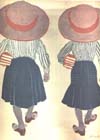
international historical review - for a gender history of women
March, 2000 |
||
Go to italian version |

|
Abstract |
Cover: from "Il giornalino della domenica" magazine, nr. 34, 1910 |
Pictures Gallery |
|
   |
Cover: Part. from "The Greek woman favorite in the harem", from the book reviewed in our magazine, "Between the Turkish women : letters 1716-1718" (Archinto pub.) by Mary Wortley Montagu. |
Abstract | Editorial
 Editorial
Editorial
During the Twentieth century the relationship with history
changes. It's above all the female way of looking at history that changes.
Much research and several books have tried to reconstruct the history of women.
During this century the expression gender was coined (genders, masculine
and feminine, are a historical and cultural element, not only a natural one)
and also gender history, which tries to analyse the different relationships
between the sexes during the various historical periods, was born. It has
become clearer and clearer that this particular way of looking at things which
has "discovered" a new subject/object in studying history, has highlighted
other aspects of history, too. From Michel Foucault to Carlo Ginzburg the
history of outcasts - and women have been throughout the past centuries the
biggest group of outcasts - has been included.
We discover the true nature of society through the story of outcasts, historical
"truth" can be discovered through the smallest clues (in one of
his essays of 1979 Ginzburg called these clues "spies") that are
more easily detectable in details or in secondary events than in the general
picture.
During the last decades the research and the production of texts about the
history of women have been rich - as far as their results, their structure
and their quality are concerned. Sherazade wants to make them known
because the authors are convinced that one of the factors limiting this rich
production is its scanty diffusion.
"Gender history" called is still too little known, especially in
Italy. First of all this magazine wants to review interesting works produced
during recent years in this field, with particular attention given to texts
that - because of their themes and structure - can be used to teach and popularize
the history of women. The reviews concern both books recently published and
works published from the Seventies onwards, which have sometimes been forgotten
and which, at times, cannot be found.
We will wait for, and give great importance to, the works that you will highlight
for us, such as the latest products of minor publishers or specialized magazines,
apart from works still in progress, especially as far as Sicily is concerned.
by Pina La Villa
 Abstract
Abstract
The March issue of Sherazade is dedicated, as far as
the methodological part is concerned to an extract from the work "Gender,
bodies, subjects : new maps for new stories" (Genere, corpi, soggetti
: nuove mappe per nuove storie) by Emma Baeri, who researches Modern History
at Catania University. She has been working for some time now on historical
projects based on gender, facing, in a strongly critical and innovating way,
the problems concerning the language, tools and methods of such research.
During the last few years her reflections have been enriched by her participation
in the Didactic Commission of the Italian Society of Women Historians.
The section Documents contains a document which speaks against the recent
war in ex-Jugoslavia, written by the teachers who took part in the teacher
training course "New words, new methods" which itself took place
in Bacoli (Naples) at the end of March, at the time of the initial NATO bombardment
of ex-Jugoslavia.
The review section deals with various books, whose themes range from the Middle
Ages (with a series of essays by the English historian Eileen Power collected
by the publisher Einaudi) to the Modern Age: letters from the East written
by Lady Mary Montagu, an English traveller of the Seventeenth century, with
an interesting introduction by Anita Desai; a beautiful book by Bruna Peyrot
about the Huguenot women who were kept prisoner in the Tower of Costance in
the Eighteenth century; German Feminism and Russian Terrorism in the Nineteenth
century; and a book dealing with Twentieth century Feminism and Pacifism "The
lamps and the circle" (I lumi e il cerchio, 1992) by Emma Baeri
- the word lumi of the title refers to the Enlightenment.
With this work we start dealing with the problem of research and the transmission
of gender history, considering also "Generations, transmission of history
and traditions of women" (Generazioni, trasmissione della storia e
tradizione delle donne), published by Rosenberg and Sellier, and "Teaching
a gender difference" (Per una didattica della differenza di genere,
Pensa Multimedia).
English texts by Vincenza Leonardi